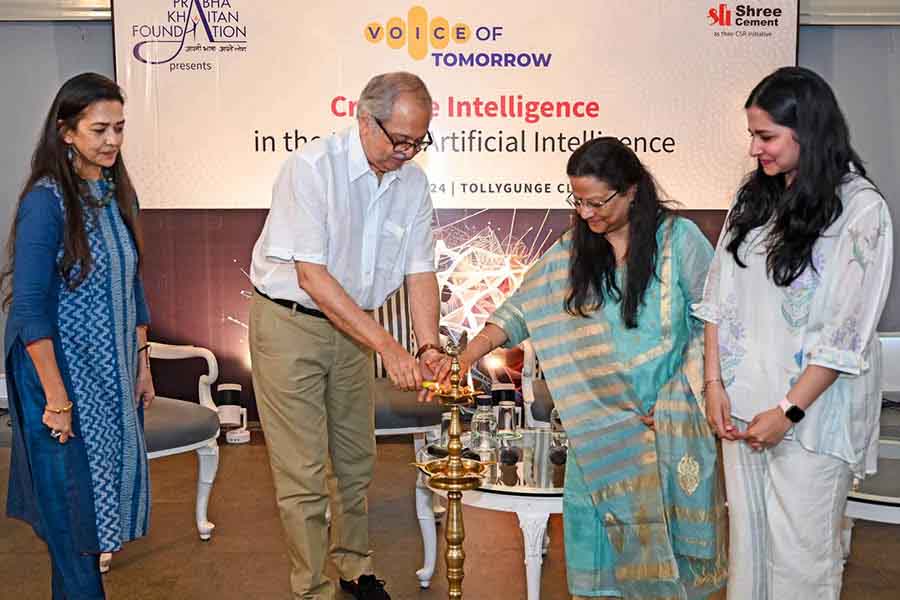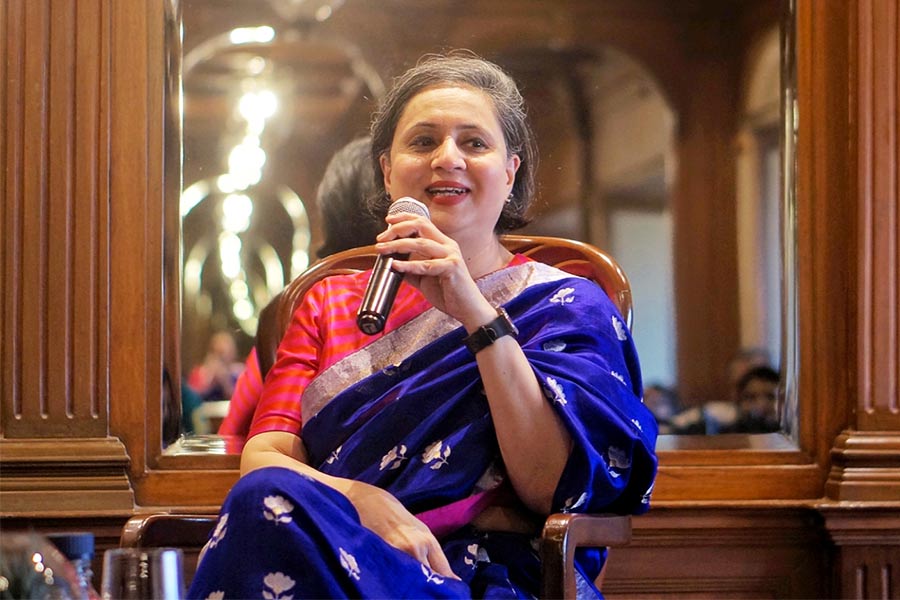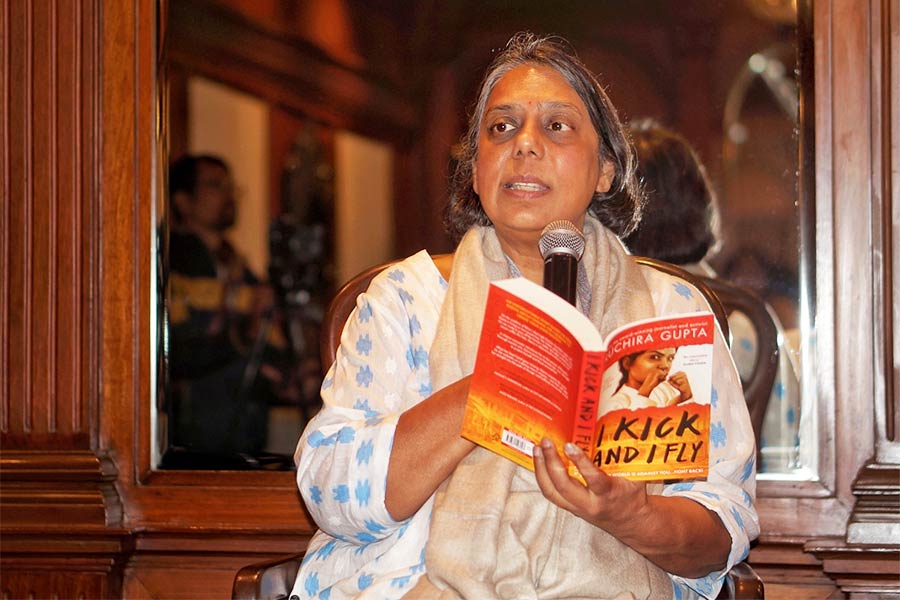When Charles Dickens famously wrote, “It was the best of times, it was the worst of times” in A Tale of Two Cities, he was referring to the world of 18th century England and France, plagued by social evils. Setting up a riveting narrative against the palpable tension preceding and following the French Revolution, Dickens created a story that has reached millions since. And his words still hold true today. While advancements in science have made life easier than it was in the late 18th century, it has also, in many ways, complicated the particulars of existence.
To discuss the merits and demerits of Artificial Intelligence (AI), the most transformative advancement of recent times, the Prabha Khaitan Foundation organised the first edition of Voice of Tomorrow, an ideas’ festival, on the theme of ‘Creative Intelligence in the Time of Artificial Intelligence’, in association with Shree Cement Limited, at the Balmer and Lawrie Hall, Tollygunge Club, on March 16.
‘Will AI be able to create great art and can Artificial Intelligence enable us to take the correct ethical course?’
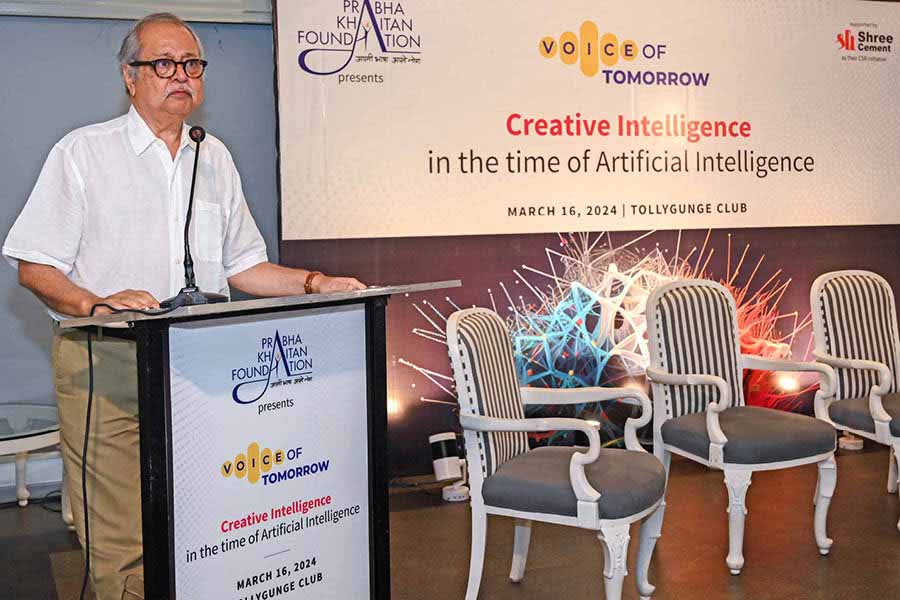
Rudrangshu Mukherjee delivers the keynote address
Following the inauguration of the programme by Anindita Chatterjee, executive trustee, Prabha Khaitan Foundation; Manisha Jain, honorary COO, Prabha Khaitan Foundation; Esha Dutta, Ehsaas Woman of Kolkata; and Rudrangshu Mukherjee, historian and chancellor of Ashoka University, Mukherjee delivered the keynote speech for the event.
“I must start by pointing out a contradiction. Artificial Intelligence was actually created by creative intelligence — a group of extraordinarily talented scientists and thinkers got together to create Artificial Intelligence… AI is now trying to erode some of the innovative abilities and intelligence of human beings,” began Mukherjee, before warning the audience that “we have forgotten where information ends and knowledge begins”. “Will AI be able to create great art and can Artificial Intelligence enable us to take the correct ethical course?” asked Mukherjee, elucidating his point with powerful examples from the Mahabharata, before the panel discussions for the day got underway.
‘In creative writing, we can use ChatGPT as a service provider, a user-friendly software’
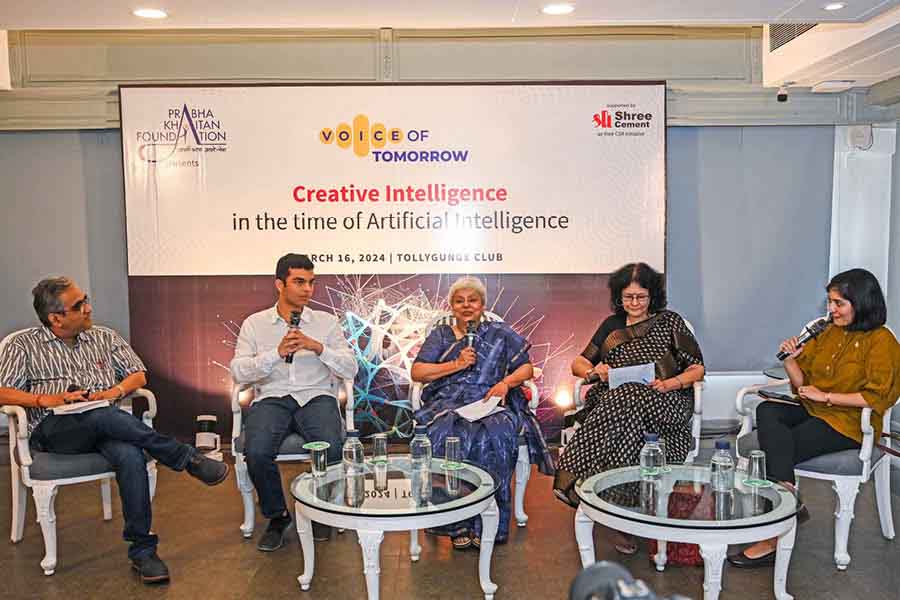
(L-R): Shantanu Ray Chaudhuri, Nikhilesh Mukherjee, Sumita Banerjea, Sanjukta Dasgupta and Ramona Sen
The first panel discussion of the day was on the impact of AI on literature in a session titled, ‘Words’ Worth: What AI Brings to Literature’. The participants of the panel discussion were editor Shantanu Ray Chaudhuri, professor and academic Sanjukta Dasgupta, author Sumita Banerjea, and Nikhilesh Mukherjee, a class XII student of La Martiniere for Boys, Kolkata. They were in conversation with author Ramona Sen. When asked which character from literature could be a robot passing off as a human, the panellists had unique answers to share, from Feluda and Professor Calculus to Miss Lemon, Don Quixote and Dr Faustus, among others.
“In 2024, I can state with confidence that creative imagination and emotional intelligence can defy algorithms. To anticipate that AI would be a Salman Rushdie or a Paul Finch in terms of blending memories, ideologies and philosophy by generating visions of a brave new world… that time I feel is yet to arrive. In creative writing we can use ChatGPT as a service provider, a user-friendly software. But as a storyteller, human intelligence would prevent us from copying and pasting,” said Dasgupta. Banerjea similarly argued for the power of storytelling both in businesses and in creating works of art. She also pointed out that on the question of ethics, using AI can bypass copyrighted work, which could be detrimental.
“I think because the author can go beyond the context of what they are writing is what makes literary classics timeless. For this, one would need to find an inner voice and a level of introspection. Just reading a large number of books doesn’t allow one to develop that. That’s a trap that ChatGPT falls into. Because it’s so well-read and exposed, I feel that its ability to find something unique that would resonate with its readers is compromised,” said Mukherjee, when asked how he feels AI fares against the classics. Chaudhuri, on the other hand, pointed out that, as an editor, he is sceptical of what is happening in the world of literature: “While editing software can do a good enough job, it’ll never be able to capture the essence of a text. However, very successful experiments have been carried out wherein ChatGPT has been able to write stories in the style of popular writers and produce texts good enough to be published.”
How AI is changing analysis, scouting and performance in sports
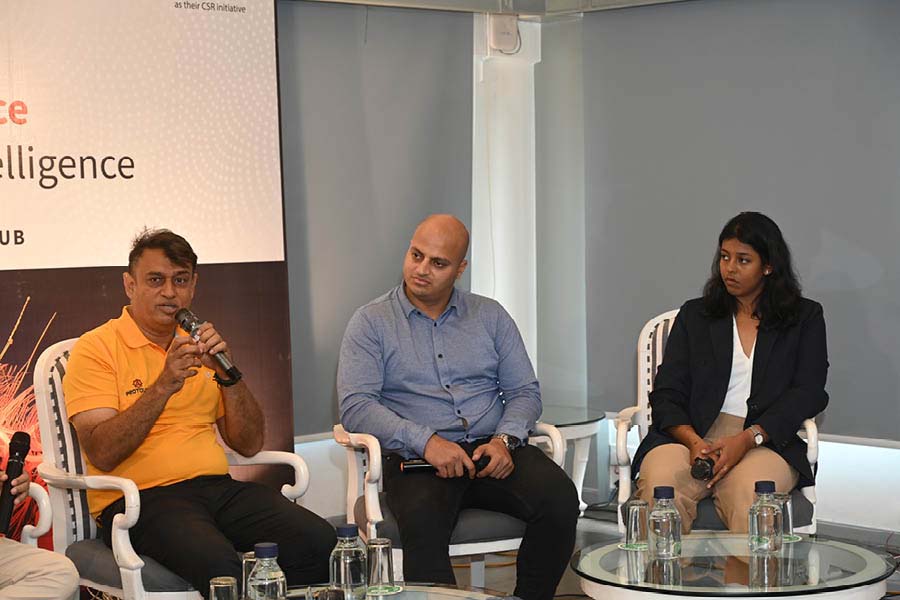
(L-R): Indrajit Bhalotia, Anuj Kichlu and Shweta Brahmachari
The next panel of the day centred around the impact of AI on sports in a session titled, ‘In Your Corner: The AI Punch in Sports’. The panel included Indrajit Bhalotia, professional golfer and founder of Protouch Sports; Anuj Kichlu, the CEO of Best of You India; and Shweta Brahmachari, who has rowed in national as well as international competitions. They were in conversation with journalist Priyam Marik.
At his golf academy called Champ for Life at Tollygunge Club, Bhalotia has already opened India’s first AI-integrated golf studio. “The biggest change we saw when we integrated this AI technology is how well you can see and analyse a golf swing. We have a state-of-the-art teaching studio with four cameras and split screens that help the golfers analyse their shots. With AI, we just shoot one video with our iPhone, which gets uploaded to an AI server in the US, and within a minute and a half, the golfer is turned into a mannequin, which can be seen from 360 degrees. Each frame gets broken into 300 different frames and each frame can be seen from 64 different angles. With AI, you can now analyse someone’s game down to the finest millimetres,” explained Bhalotia.
But how can AI help in a sport like football, which has traditionally been resistant to technological advancements? “AI is supplementing refereeing instead of overtaking or ambushing them. In terms of scouting, AI is used for performance analysis. But the final decision comes down to the coach and the owner [as the case maybe],” said Kichlu. “AI actually holds a lot of power in enhancing our athletic performance,” remarked Brahmachari. “But coming to AI in rowing, we already have AI that analyses the biomechanical data from the different equipment that we use, which helps us to reach the maximum efficiency in each stroke. But I’m looking forward to the predictive model of AI, which can tell me if I’m rowing optimally without losing time,” added Bhramachari.
However, using AI in sports also brings up the question of fairness. Bhalotia feels that whoever has access to AI and training will do well: “I think every country has that budget to incorporate that kind of AI training.” Kichlu, on the other hand, feels that even with the presence of AI, the outcome of a game depends completely on the performance of the players. “We can’t control what resources the opponents have access to in terms of training. But if AI can help me with personalised training, which is periodisation in terms of rest and recovery and physiological factors, then I don’t think AI is negative,” said Brahmachari.
A healthier future with AI, but with stringent data privacy measures
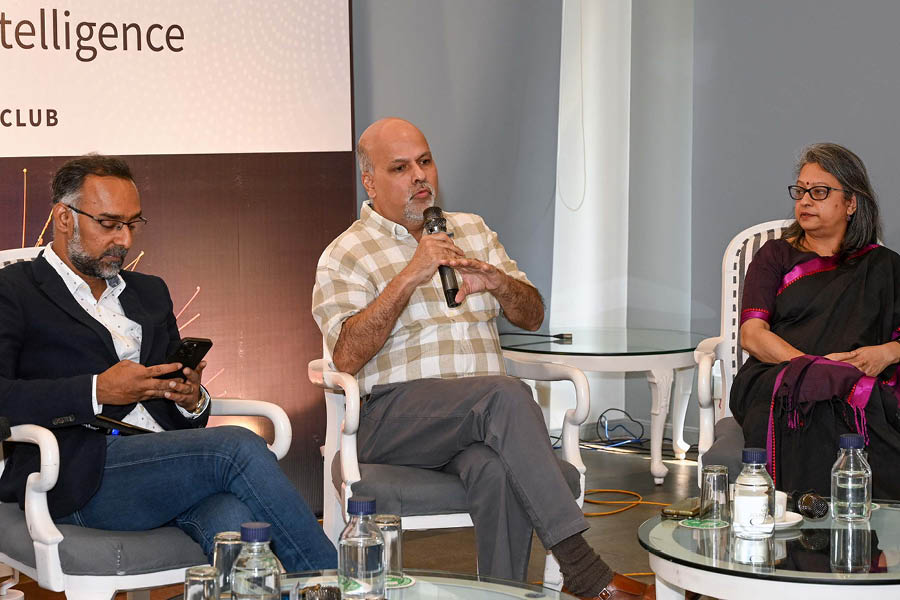
(L-R) Ayanabh Debgupta, Jai Ranjan Ram and Sushmita Roychowdhury
One of the areas where AI has made remarkable progress is healthcare. To discuss the impact of AI in healthcare, Marik was in conversation with psychiatrist Jai Ranjam Ram, pulmonologist Sushmita Roychowdhury, and Ayanabh Debgupta, a co-founder of the Medica group of hospitals, in a session titled ‘Just What the Doctor Ordered? AI and Healthcare’.
“Healthcare revolves around two key factors: accessibility and affordability. Accessibility involves delivering healthcare at primary, secondary and tertiary levels with a significant portion concentrated in urban areas. The challenge lies in ensuring access beyond urban centres, a problem that AI might help address. Affordability is another issue, despite healthcare being theoretically available. The global conversation around universal healthcare highlights the roles of both private and government sectors. However, technology, particularly AI, could potentially reduce healthcare costs, an aspect worth exploring,” noted Debgupta.
This perspective was agreed upon by both Ram and Roychowdhury. Ram added that medicine requires wisdom. “AI is intelligence — it is not wisdom that has been gained by looking at 30,000 X-rays. This distinction between intelligence and wisdom will stand true whichever field AI is used in. While AI is increasingly being used in mental health support apps, data privacy is still a concern,” argued Ram.
“AI is helpful for people who have already been diagnosed with asthma and COPD. Neck pieces have been introduced that tell people when their breathing pattern is becoming abnormal. Young people often stop using inhalers for asthma when they’re feeling fine. When they go for runs, AI, in the form of a peak flow meter, can alert them whenever their airway is tight. Similarly, for lung cancer, AI can bring about an early diagnosis, which boosts the chances of cure,” observed Roychowdhury.
‘Even if AI produces set design and takes care of production, will there be an artist’s touch?’
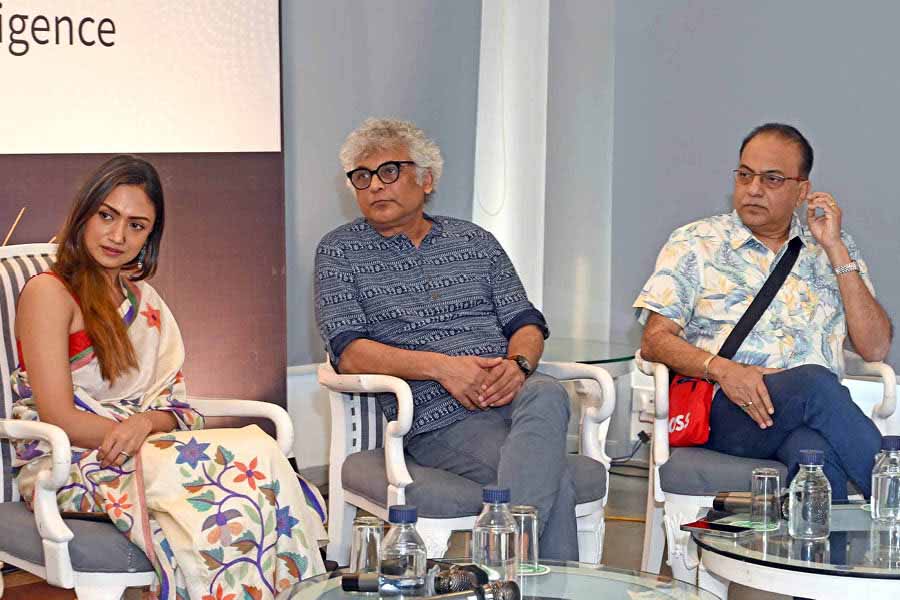
(L-R) Shruti Das, Suman Mukhopadhyay and Arindam Sil
The last session of the day revolved around the impact of AI in films in a session called ‘Tech-tainment: AI and Films’. Film producer Hasnu Mukherjee was in conversation with directors Arindam Sil and Suman Mukhopadhyay and actress Shruti Das.
“I don’t have anything against technology if it helps in enhancing my creativity. But I don’t want technology to take over my creativity… AI helps in the editing process but if we have the same editing technology, wouldn’t films start looking similar? Does AI take care of my emotions and creative vision?” responded Sil when asked for his opinion on AI in the making and editing of cinema.
“Filmmaking is dependent on the specific gaze of the filmmaker. AI taking care of editing, scripting, direction and set design is the dream of streaming platforms like Netflix where they want to produce more content, but the individualism of films will be lost that way. A film becomes unique because of the filmmaker’s perspective,” said Mukhopadhyay. “Even if AI produces set design and takes care of production, will there be an artist’s touch? Someone has to have a bigger picture. AI will give you options and variations. But will it be able to create art?” asked Das.
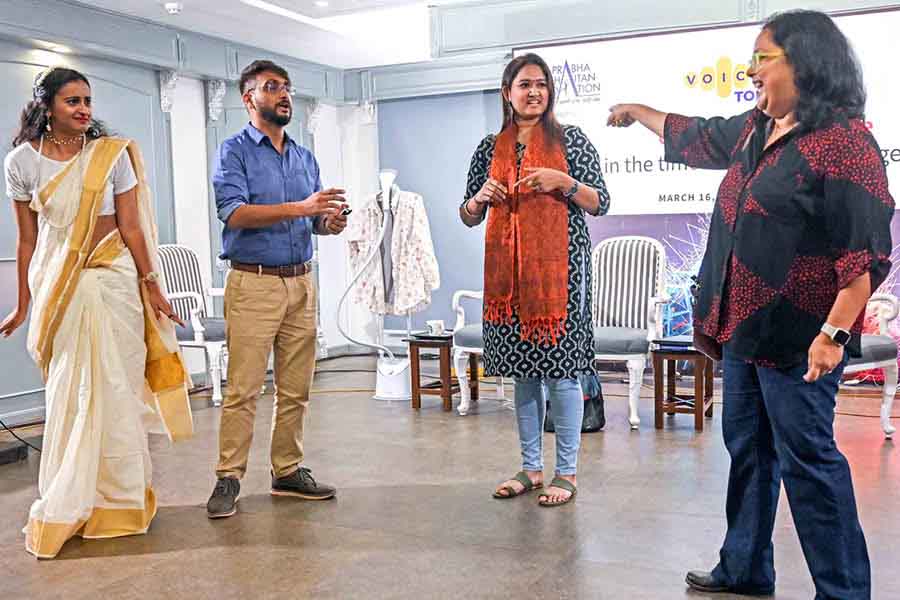
A scene from ‘Love in the Time of Bots’
Each of the panels also featured an invigorating Q&A session with the audience, which included students and faculty members from The Bhawanipur Education Society College, iLead Kolkata and St. Xavier’s College, Kolkata. The final segment of the event was a one-act play called Love in the Time of Bots, produced by Blotting Paper and directed by Sharmistha Pandey. Interestingly, the script for the play, which follows a young man’s journey as he falls in love with a human as well as an AI bot, was written by ChatGPT, with edits made by Ankit Santra. The cast for the play comprised Eliza Zaman (as Shreya), Sreeja Ghosh (as Donna), Sharmana Chakraborty (as Eve) and Mrinmoy Chatterjee (as Ryan), with Sridip Bhattacharya as the sound engineer.
With the play bringing Voice of Tomorrow to an entertaining climax, Sukanya Das, the emcee for the event, delivered the vote of thanks as the curtain came down on a thought-provoking festival.
